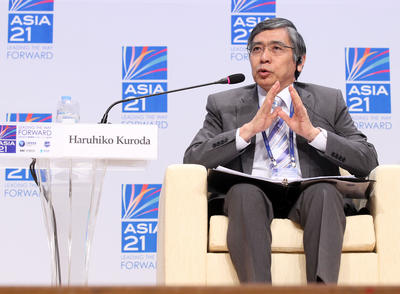in a hurry, behind closed doors, without competition, and with the nomination coming from Japan.
At their 2009 summit in Pittsburgh, G20 leaders agreed that the head of any international institution should be appointed through an ‘open, transparent and merit-based process’. Subsequently, leaders of the World Bank, the IMF and the European Bank for Reconstruction and Development were all for the first time replaced through open contest.
In reality, there wasn’t much chance that the World Bank and IMF jobs would be awarded to anyone other than Jim Yong Kim and Christine Lagarde, but the nationality of the victors might be less predictable next time around. As for the European Bank for Reconstruction and Development presidency, few would have bet on a UK candidate, given that London is the seat of the bank, but respected UK civil servant Suma Chakrabarti beat a strong field on merit.
Cross to Asia and the vacancy left by ADB president Haruhiko Kuroda, effective 18 March 2013. The ADB’s charter requires that Kuroda’s replacement be elected by the bank’s governors, and that candidates be nationals of regional member countries. In practice, ADB presidents — eight of them since the Bank’s founding in 1966 — have always been nominated by Japan and rubber-stamped by everybody else. Could this really have happened again?
One searches the ADB’s website in vain for any hints as to the appointment process for Kuroda’s replacement. There’s no information on how and by when to nominate, nor any selection criteria. If one actually asks the ADB, they reveal that the nomination period opened on 7 March and closed on 24 March — a remarkably short window of two weeks. Following that, governors had a month to ‘elect’ the new president. Only the identity of the successful candidate will be publicly announced.
The Japanese government quickly nominated Takehiko Nakao, deputy finance minister for international affairs, in terms that made it clear they expected no alternative candidate. The ADB’s host country, the Philippines, welcomed his nomination, fatalistically stating, ‘we look forward to working with him’. Indonesia also indicated that it expects the ADB presidency to stay with Japan. No other candidates were put forward. Nakao’s appointment is now confirmed.
The ADB’s closed-door and uncompetitive presidential appointment process stands in stark contrast to the processes used by other international financial institutions. Japan’s candidate might well have been strong, but one can easily think of other good ones. Boediono, Indonesia’s vice president and former head of the country’s central bank, has the financial and leadership credentials. Australia’s former treasurer Peter Costello would have been another credible candidate.
The ADB has taken important steps to improve its transparency and accountability in recent times. It was the first multilateral development bank to publish an annual review of development effectiveness. It has recently reinvigorated its accountability mechanism, which provides an avenue of appeal for people negatively affected by its operations. And it is making more project-level information available, including audit-related information.
These and other improvements have been recognised in recent comparative assessments of multilateral organisations conducted by the United Kingdom and Australia, which have rated the ADB very highly indeed. The bank’s shareholders demonstrated strong confidence in the institution in 2009 when they agreed to increase its capital base by 200 per cent, to US$165 billion.
By defying the G20 on the leadership issue, and by putting politics ahead of merit, the ADB puts its recent reputational gains, and indeed its future effectiveness, at risk. It is not only the process for hiring the president that needs to be overhauled at the ADB. Vice presidential positions, of which there are now six, are also allocated to particular countries and groupings. And Japan has a stranglehold on some other key, senior jobs.
Why is the ADB ignoring the G20, a body where Asian countries are well represented? One plausible reason is fear of Chinese domination. This would explain the early support by the Philippines and Indonesia for the presidency staying with Japan. If so, this unedifying process is bad news not just for the ADB but for the future of Asian cooperation.
Stephen Howes is Director, Robin Davies is Associate Director, and Ashlee Betteridge is Research Officer at the Development Policy Centre, the Australian National University.
A version of this article was first published here on AsiaOne.


An excellent article. To the point – and the point is indeed disappointing.
There is heavy political influence in all appointments to the international institutions including World Bank, IMF, UN, EBRD, WTO and others. You said it: “In reality, there wasn’t much chance that the World Bank and IMF jobs would be awarded to anyone other than Jim Yong Kim and Christine Lagarde …”
It seems to be just shades of grey between the ADB appointment process and that of other institutions. Moreover, the confidence of shareholders in their subscriptions to the ADB capital base suggests they have confidence in the appointment process.